Reflecting on the FGC 101 Training at the Illinois Coalition Against Sexual Assault Conference
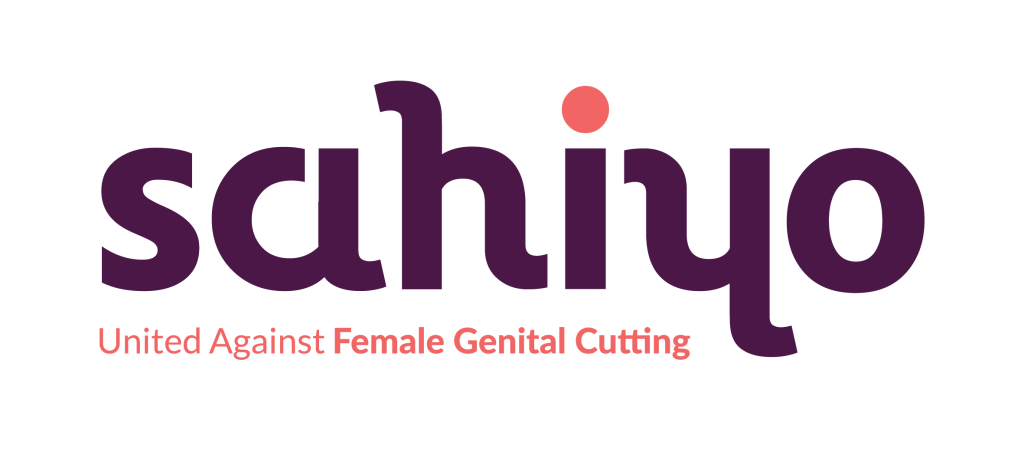
By: Jumai Olumo-Saidu Attending and presenting at the annual Illinois Coalition Against Sexual Assault (ICASA) conference in Springfield, Illinois, was a transformative experience. As a volunteer at Sahiyo and a second-year community psychology student at the National Louis University, I co-led an FGC 101 training session with Sahiyo’s Training and Technical Assistance Coordinator, Aries Nuno to educate advocates working in the sexual assault and gender-based violence field on the topic of female genital cutting (FGC). This blog reflects on my experience, interactions with the audience, and the impact our FGC 101 training at this conference had on my personal and professional growth. There were several moments during the FGC 101 presentation that stood out to me. The introduction to FGC, USA statistics, and the specific context of FGC, how it occurs, and who is impacted by it in Illinois all set the stage for a thought-provoking discussion. One memorable interaction was when a woman asked a question about balancing human rights with respecting cultural norms that have existed for generations. Her question highlighted the challenge of advocating against harmful practices without condemning entire cultures. This made me think deeply about approaching such sensitive topics without alienating the communities we aim to support. Another memorable moment was when a participant asked about alternative ways to empower survivors of FGC. This question shifted the focus from condemning the practice to finding constructive and supportive ways to help those who are affected by it. This moment in the presentation reminded me that our work should not only aim to end the harmful practice of FGC but also to uplift and empower survivors. The audience’s reaction to the stories of survivors was also a significant part of the presentation. The room was filled with shock and discomfort, but also curiosity. The emotional response underscored the importance of our work and the need for continued education and advocacy around this issue. The audience’s inquisitive questions highlighted the need for more awareness and understanding of FGC for the broader public, and even those working in fields related to FGC, such as human rights organizations, and those who work to fight against gender-based violence (GBV). Professional and Personal Growth This experience has had a profound impact on both my personal and professional life. Professionally, attending and participating in the conference reinforced the importance of cultural sensitivity and the need for a balanced approach when discussing FGC in my work. This experience also helped to emphasize the necessity of providing comprehensive resources and support for survivors. A prevalent myth is that FGC has health benefits, while in reality, it poses significant health risks, including chronic pain, infections, and complications in childbirth. The questions and comments from the audience offered valuable insights into such misconceptions and the gaps in knowledge about FGC that still exist today and need to be addressed. Therapeutic Aspects The conference was a therapeutic experience as well. Sharing the stories of survivors and discussing the nuances of FGC allowed me to process and reflect on the emotional weight of this work. It also reinforced my commitment to advocacy and education in this field. The supportive environment of the conference, combined with my colleagues and the audience’s shared passion, created a sense of community and solidarity that was comforting and empowering. It allowed me and the participants to voice the struggles and triumphs of advocating against FGC. The audience’s engagement and the meaningful dialogue that ensued affirmed the importance of our efforts and the positive impact we can and do have on the world. This experience reminded me why I chose this path and reinvigorated my dedication to making a difference in this space. Leading the FGC 101 training at the ICASA conference was a defining moment in my journey as a community psychology student and an advocate against FGC. The interactions and reactions from the audience were enlightening and underscored the critical need for continued education and advocacy on the practice. This experience not only contributed to my professional development but also provided a therapeutic outlet to process the emotional aspects of this work. As I move forward, I am more committed than ever to supporting survivors, educating others about FGC, and ensuring that cultural sensitivity and human rights remain at the forefront of our efforts to end this harmful practice. Related links: Sahiyo Presents FGC 101 Training at ICASA’s Annual Conference Paving the Path to End FGC in Washington State! Year 1 in Review FGC 101 Training for Volunteers at Asian Women’s Shelter
Sahiyo is thrilled The Gambia decided to keep the FGC ban in place!
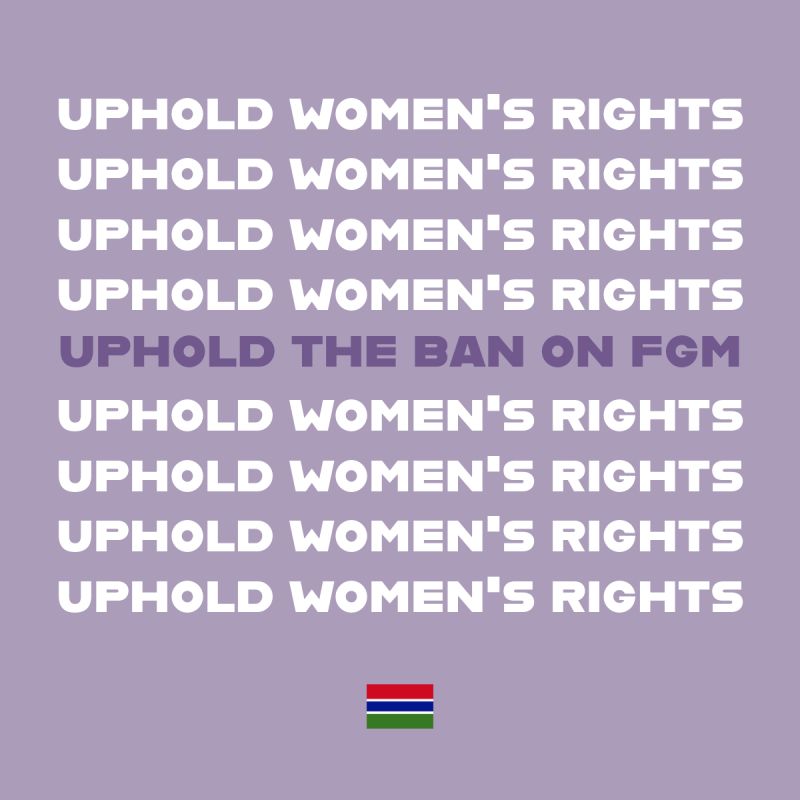
In case you haven’t heard, the Gambian authorities decided to keep the FGC ban in place and the Sahiyo community couldn’t be more thrilled! If the ban had been repealed, Gambia would have become the first country in the world to overturn a law banning FGC, setting a dangerous precedent worldwide. Sahiyo advisory member and Voices to End FGC alumni Absa Samba is a Gambian FGC survivor who told The Associated Press she celebrated with others in front of parliament. “It’s such a huge sense of relief, but I believe this is just the beginning of the work.” We’d like to thank our fellow activists and the myriad of political, medical, and legal organizations worldwide that expressed their support for maintaining the current legislation. Such support was instrumental in the decision to keep the ban in place. We hope the global outcry made it loud and clear to lawmakers worldwide: FGC legislation is not up for debate. But Absa is correct – this is just the beginning of our work. We’re ecstatic Gambian lawmakers chose the right side of history this past week, but the fact that repealing such a ban was even up for debate is troublesome. We were dangerously close to a repeal that would have rendered millions in The Gambia vulnerable. According to UNICEF, around 230 million women worldwide have undergone female genital cutting in the past eight years, with the majority in Africa and others in the Middle East and Asia. That’s an increase of 15 percent, indicating now more than ever it is critically important to stay vigilant, speak up, and work even harder to put more people at risk. To get involved in the movement to end FGC, please visit Sahiyo.org to learn more about our volunteer opportunities and various programs. You can also support Sahiyo’s work to end female genital cutting and empower survivors by donating here. To learn more about the crisis in The Gambia, read Sahiyo and the Global Platform for Action to End FGM/C’s Joint Statement on the issue published shortly before the announcement. Related links: Our Fight to End FGM in The Gambia: Who is Listening? UNICEF released new data on global prevalence of FGM/C Behind the Wall by Gambian activist and FGC survivor Isatou Jallow
Paving the Path to End FGC in Washington State! Year 1 in Review
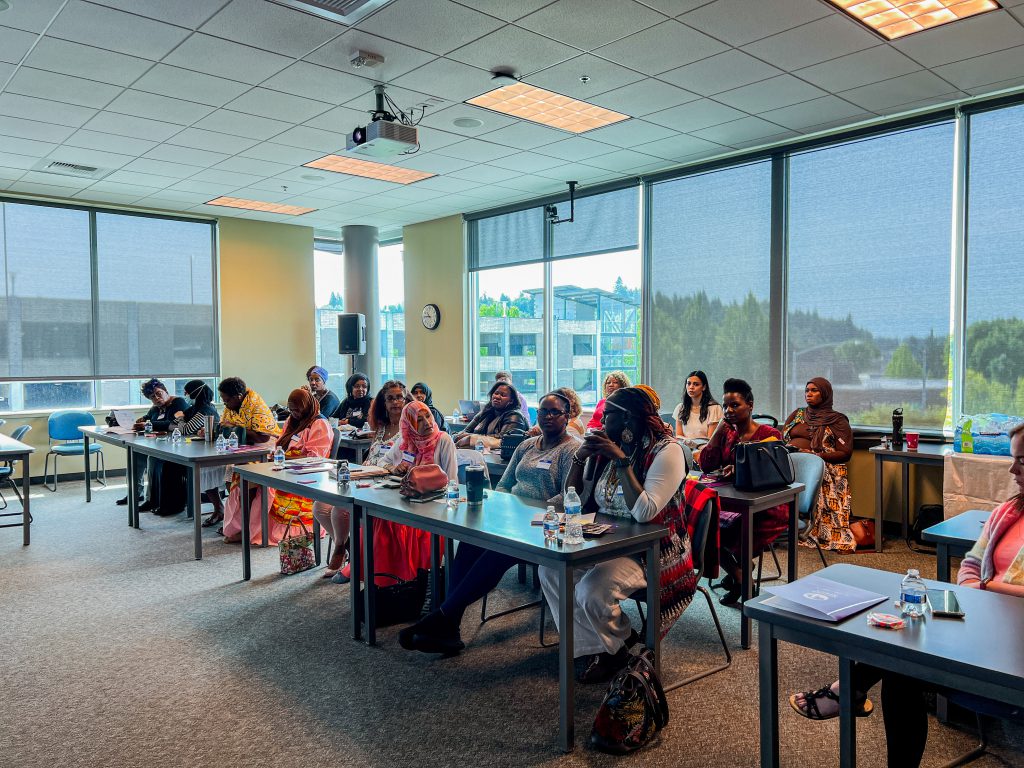
We’re excited to share the highlights of an incredible journey we’ve embarked on with our partners Mother Africa, The U.S. End FGM/C Network, and the Washington State Department of Health. Our collective mission to prevent and respond to female genital cutting (FGC) across Washington State has seen tremendous progress since Year 1 began this past March, thanks to the enthusiastic support and participation of our community members. From the very beginning, with the Washington Coalition championing the law against FGC that eventually passed in April 2023, engaging with our communities has been at the heart of our efforts. In Year 1, our outreach activities brought together over 100 individuals, creating spaces for meaningful conversations and shared learning. Through a series of informative events, including an FGC 101 training and thought-provoking webinars, we have not only spread awareness but also sparked important discussions. During this period, two of our meetings were hosted in-person in Kent, WA, inviting community members to get involved with the project and learn more about FGC. The first meeting held in April 2024, was the kick-off event for this initiative and involved various strategy sessions. Attendees collaborated in resource mapping exercises, identifying key players for our advisory committee and brainstorming innovative programming ideas. The energy and excitement in the room for this project were palpable as attendees shared their insights and built connections with individuals in their nearby communities. This event not only laid the groundwork for our project’s future activities but also exemplified our commitment to community-driven solutions and inclusive dialogue. The final in-person meeting for the year was hosted on June 13th, and included a screening session of videos from Sahiyo’s Voices to End FGM/C project titled, “Video Screening & Discussion with Survivors of FGM/C in Washington State.” This event was particularly moving, as two of the storytellers themselves were present and participated in a panel discussion answering questions about their experiences, insights, and what they are looking forward to with this project. These moments of connection remind us of the importance of community-led initiatives and the power of storytelling in fostering understanding and empathy. As we look forward to Year 2, we are filled with hope and determination! To learn more visit the project’s website and watch the Year 1 below: [youtube url=”https://www.youtube.com/watch?v=BaPL70v6LjE”]
Reflecting on Our Father’s Day Bhaiyo Campaign

We would like to thank all of those who participated in our public awareness campaign surrounding male engagement in the movement against FGC. In honor of Father’s Day 2024, Sahiyo’s male engagement program, Bhaiyo, launched a campaign to help survivors and activists have productive conversations with the men in their lives about FGC. Throughout June and into July, we shared videos, quotes and articles on our social media platforms and blog, highlighting how men can raise awareness about FGC and voicing their support for ending the practice. We encourage you to take a look at the inspiring blogs and posts that were published throughout this campaign: Breaking the Silence: A Conversation with My Father About FGM/C The practice of khatna on girls must stop / છોકરીઓ પર ખત્નાની પ્રથા બંધ થવી જોઈએ Starting the Dialogue: Sharing Your Experiences on Initiating Conversations with Men about Female Genital Cutting Ending FGM – Fight the Mansplaining, Toxic Masculinity, and Patriarchy To view the social media posts from this campaign please visit our Instagram page @sahiyovoices. Once again we would like to thank all of those who participated in the campaign, your efforts to engage in difficult, thought provoking, and important conversations with the men in your lives is crucial in the movement to end FGC. To learn more about Sahiyo’s male engagement program, Bhaiyo, click here. /images/bhaiyofathersday.png
A Conversation On Intersectionality: Sahiyo and The U.S. Network Launch Pilot Project
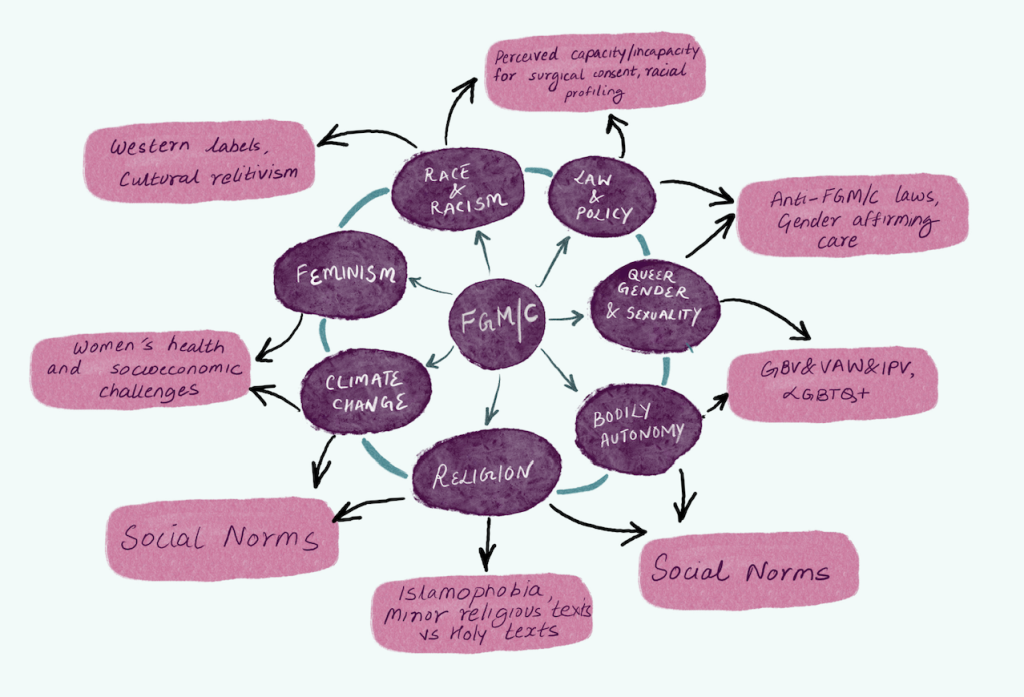
We are eager to uplift an ongoing collaboration between Sahiyo U.S. and the U.S. End FGM/C Network. Inspired by the U.S. Network’s upcoming release of its Survivor Listening Session Summary Report and Sahiyo U.S.’s ongoing Critical Intersections Research Project, the two entities have joined forces for a pilot project around intersectionality and FGC. In May, the U.S. Network and Sahiyo began sending out bi-weekly discussion questions to both organization’s respective listservs; these questions prompt activists and allies within the anti-FGC field to consider intersections between different social oppressions and FGC. Topics addressed by the questions include ties between FGC and religion, the conflation of gender-affirming care and FGC, racial stereotyping, and more. The goals of this initiative are as follows: To gather insight on various intersectional challenges from members of the Network. To share these responses with other stakeholders outside of the Network to facilitate dialogue on the topic of intersectional approaches to ending FGC. If you are interested in any of the topics listed above and want to be a part of these conversations, please email either Caitlin LeMay of the U.S. Network (caitlin@endfgmnetwork.org) or Rachel Wine of Sahiyo (rachel@sahiyo.org) for more information. To learn more about Sahiyo’s Critical Intersections project, click here.
That Old Familiar Violence – Reflecting on AAS 2024
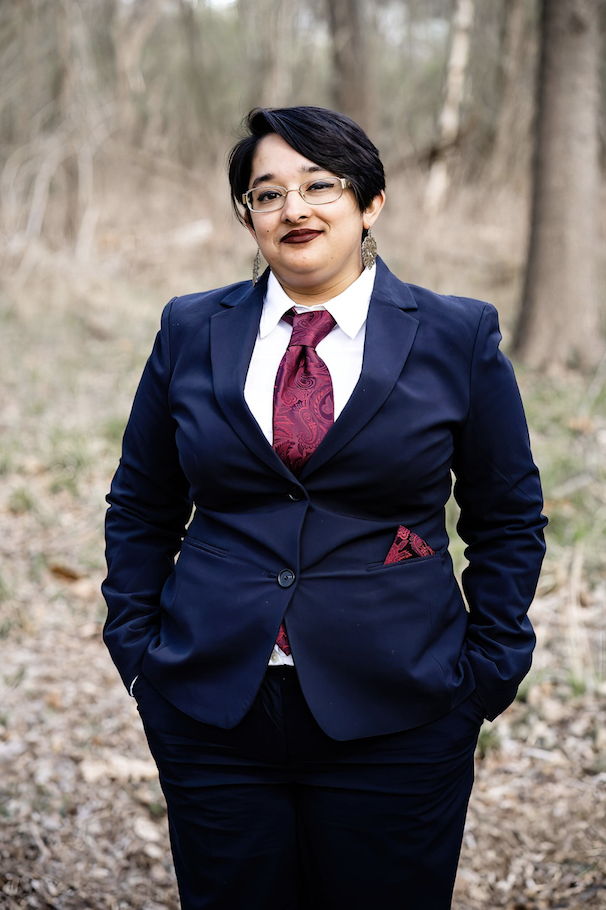
By Umme Kulsoom Arif Seattle, Washington. March 15, 2024. 9:00AM. The presentation room is small and its audience even smaller, with just about six or seven seated in a space meant to fit thirty listeners. I count myself as apart from them, seated nervously at the front of the room with my fellow panelists and professors all with fascinating and powerful subjects of interest — true scholars, honored in academia, years of experience and dedicated research behind them. And then there’s me — an interloper. Existing on the outskirts of spaces is not an unfamiliar feeling to me. At the 2024 Association for Asian Studies Conference, I was a non-academic, a formerly practicing attorney now working at a university as an academic counselor. This may have been fine to me, were I a mere attendee, a voyeur on the outside of the conversation, observing and learning. Barely noticed, but not enough to be spoken to. Unfortunately for me and my imposter syndrome, I had a paper to present. I chose to write Boxed-In: Considering the Impact of FGM/C on Queerness and Sexuality in the South Asian Diaspora in America as a scholarly personal narrative because — in truth — I wasn’t sure what Queer perspectives were out there for FGM/C survivors and did not have the emotional courage to put out a call for voices. I was familiar with activist artist and writer Dena Igusti, whose work and open existence as a non-binary survivor was what gave me the courage to attach non-binary to myself and my survivor status, and though our experiences mirrored each other, I found myself struggling to find academic research surrounding what it meant to be the victim of a very gendered act while simultaneously wanting to reject being seen as that gender. FGM/C happened to me because someone else decided I was a woman long before I was old enough to understand what womanhood and girlhood meant, much less able to process what it meant for me. As a result of it, I will always be associated with my “dead” womanhood, further denied my agency and reminded of such every time “she” and “her” are used in association with me. Therefore, selfishly, I wrote my paper to reclaim my identity and make myself whole. It sort of worked. The day before our scheduled panel presentation, as we rehearsed our various speeches, I corrected the panel moderator — my speaker bio had “they” and “their” in it, instead of “she” and “her” — and then stood to practice my speech before my fellow speakers. I anticipated it — strict adherence to (incorrect, outdated, prescriptivist, cruel) “rules” of grammar pretend that the singular “they” is an impossibility in English — but anticipation certainly doesn’t stop that low-grade invalidation from hurting. My speech even called this out, promising, “I can even guarantee you this — once you leave this room, once I am done talking — you will forget. You will perceive me — surrounded by the trappings of my assigned womanhood — and you will forget. So you will fall back on that old familiar violence — she and her.” I was right. The day of the presentation, my speaker biography is read aloud and — despite the words they and their written on the page — she and her pour out from the moderator presenting me. Looking back, I imagine the audience saw me wince before I began speaking. Dena Igusti called this experience — this perpetual association with cis-womanhood — a “quiet violence.” They aren’t wrong. As a non-binary survivor, I have to weigh my physical safety every time I enter a survivor space, or engage in anti-FGM/C activism. Will my identity be respected? Will gender-affirming care once more be equated to FGM/C, forcing me to out myself in non-affirming company in an effort to defend the rest of my trans and non-binary community? Will the push to ban FGM/C on the state level be co-opted by hate the way it nearly has been in Texas through bills like SB249 or similar bills in many other states? On some level, this feels intentional. In survivor spaces, womanhood is elevated because of FGM/C’s attack on it. My imposition in these spaces is allowed as a courtesy, and I reluctantly accept “she” as a courtesy in return, accepting the violence that erases my identity in an effort to receive solidarity and support for the violence that granted me it. At the conference, I am both unable and unwilling to make this concession. Accustomed to butchery as I am, I speak to a teary-eyed audience of the ways I — as an example of non-binary survivorship, should more than I exist — carve my many identities into pieces to make myself more palatable to the disparate communities I am desperate to belong to. I call out this indifference to queer survivorship — likely the reason so few exist publicly, unable to comfortably come out and seek necessary support — and the way the movement to end FGM/C quietly includes trans-exclusionary voices, both because TERFs (defined by Oxford Languages as: a person whose views on gender identity are considered hostile to transgender people, or who opposes social and political policies designed to be inclusive of transgender people.) love to co-opt the term “genital mutilation” to make the case against gender-affirming care and because the inherent attack on womanhood that is FGM/C leads to many forgetting that those who don’t identify as women can still be victimized. Make no mistake — I am grateful for the opportunity to attend the AAS Conference and the support given by Sahiyo to make that possible. I am grateful for the opportunity to speak and make even the slightest effort at raising awareness and using storytelling as activism. That does not erase the profound loneliness and struggle of being a minority within a minority, double-marginalized and forced to choose between identity and activism. It can be annoying. I get it. Being publicly corrected, interrupted mid-thought
Reflecting on Virtual and In-Person Sessions for Voices to End FGM/C Workshop 2024
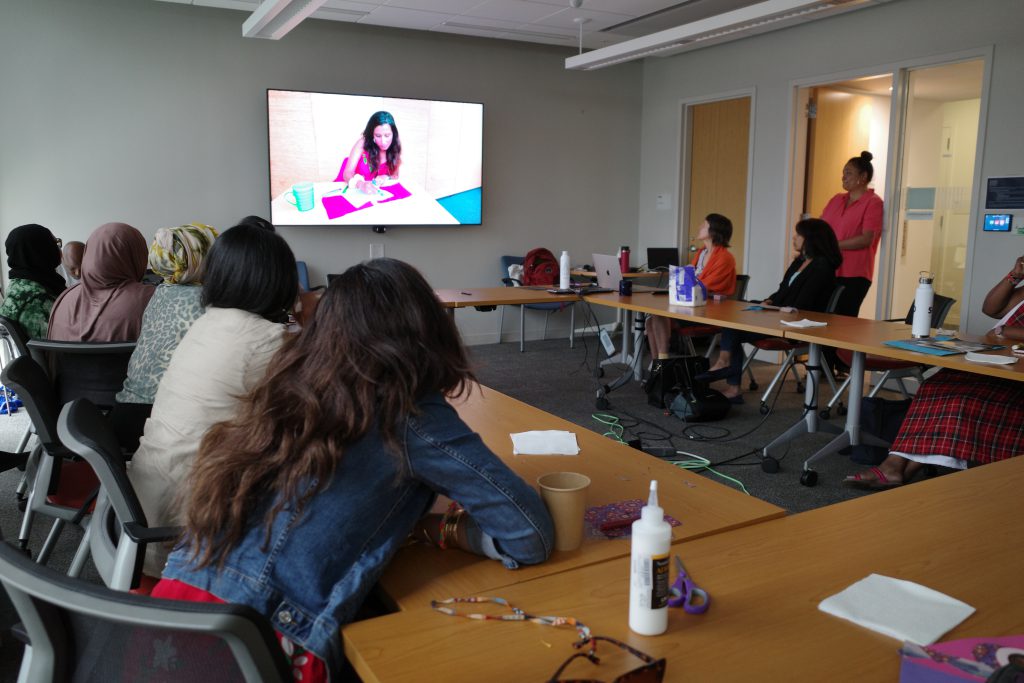
Sahiyo completed our 2024 Voices to End FGM/C digital storytelling workshop, welcoming 10 new storytellers to our ninth cohort. Since 2018, this initiative has united over 80 survivors, advocates, and community members in sessions designed to empower participants to share their personal stories and experiences with FGC. This year’s workshop was held in a hybrid format, starting with two virtual sessions on May 28 and June 4. These initial online gatherings allowed participants to introduce themselves, share their experiences, and begin forming deep, meaningful connections. The virtual sessions provided a safe and intimate space for storytelling, laying the groundwork for the in-person sessions that followed on June 22-23 at the George Washington University Milken School of Public Health in Washington, D.C. Once everyone gathered in person, the excitement was palpable as participants, who had bonded over their virtual interactions, finally met face-to-face. The atmosphere was like a reunion of old friends, filled with warmth and familiarity, as the intimate stories that had already been shared created strong bonds among them. During the in-person sessions, participants engaged in various activities designed to deepen their reflections and creative expressions as they recorded the audio and pieced together the visuals for their digital stories. A particularly touching moment was when a participant gifted beautiful scarves to the workshop facilitators, as a way to express her gratitude for the workshop and the supportive community it cultivated. She explained that this gesture is a custom in her community in Ethiopia, symbolizing appreciation and connection. To capture the inner workings and overall essence of the workshop, we invited a videographer and photographer to document the event on our last day together. They took photos and b-roll footage to create a behind-the-scenes video about the workshop. Facilitators and participants were interviewed about their roles and experiences, and storytellers shared their hopes and aspirations for their videos. These interviews provided deeper insights into the personal journeys, the impact of the workshop, and how the Voices to End FGM/C program has grown over the past few years. Both the virtual and in-person sessions were transformative, allowing participants to engage in a supportive space where interactions fostered a strong sense of community and solidarity. We are excited to share their stories with all of you in the coming months, showcasing the participants’ courage and commitment to ending FGC. To learn more about the Voices to END FGM/C program click here.
Sahiyo’s U.S. Executive Director will discuss transnational FGC at the United Nations in Geneva
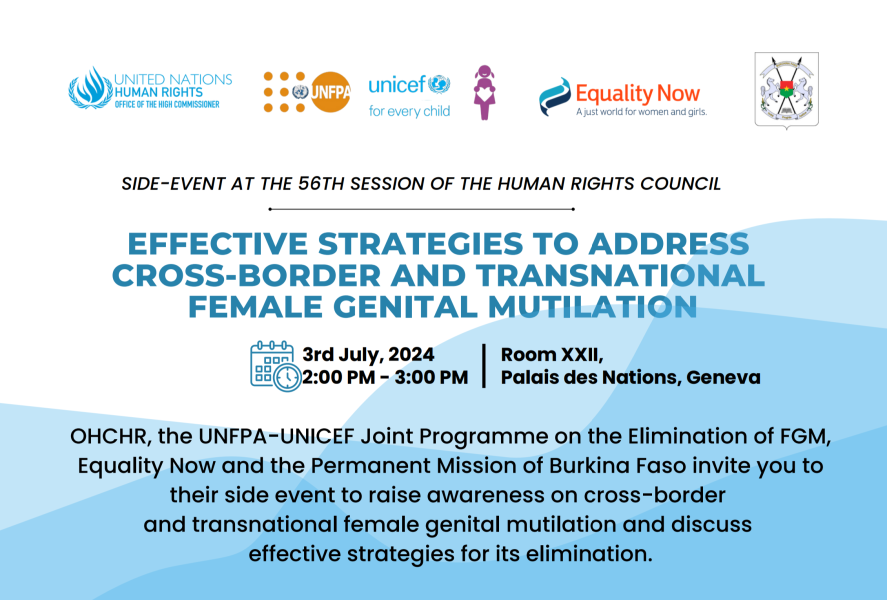
On July 3rd, Sahiyo’s co-founder and U.S. Executive Director Mariya Taher will discuss cross-border and transnational female genital cutting (FGC) during the fifty-sixth session of the United Nations Human Rights Council (UNHRC) at the United Nations in Geneva, Switzerland. This Side Event conducted in collaboration with OHCHR, the UNFPA-UNICEF Joint Programme on the Elimination of Female Genital Mutilation, Equality Now, and the Permanent Mission of Burkina Faso,aims to raise awareness about cross-border and transnational female genital mutilation/cutting. The panel discussion will also aim to provide a platform for various stakeholders, including states, UN agencies, civil society organizations and survivors, to discuss what can be done in response Cross-border and transnational female genital mutilation/cutting is poorly documented yet critical to address if we want to end this harmful practice. Gaps in national and regional legal frameworks, lack of systematic and coordinated cooperation, and insufficient resources are just some of the challenges activists face in working to prevent it. The moderator for this event is Divya Srinivasan, the Global Lead on Ending Harmful Practices at Equality Now. Speakers include: H.E. Ambassador Nadine Traore Bazie, Chargée d’affaires, Permanent Mission of Burkina Faso, who will give the opening remarks. Hannah Wu, OHCHR who will present the findings of the report on cross-border and transnational female genital mutilation. Julia Bunting, UNFPA who will discuss the work of the UNFPA-UNICEF Joint Programme on the elimination of female genital mutilation. H.E. Dr. Isatou Touray, Former Vice President of The Gambia and Executive Director of Gambia Committee on Traditional Practices Affecting the Health of Women and Children (GAMCOTRAP), will highlight cross-border female genital mutilation. Mariya Taher, Survivor and Executive Director of Sahiyo, U.S., who will discuss the issue of transnational female genital mutilation. To keep up with all of Sahiyo’s events, bookmark Sahiyo’s events calendar. You can also subscribe to our newsletter.
Ending FGM – Fight the Mansplaining, Toxic Masculinity, and Patriarchy

By: Brad Mazon (originally published on Brad’s blog and reshared with his permission) I’ve been involved with, and have worked against, the torture of Female Genital Mutilation (FGM) since I worked with the U.S. Department of State in Somalia as a graduate school intern. The #EndFGM movement has experienced many successes over the years in terms of anti-FGM legislation and engaging men and boys in learning about this human rights violation. As I sat in on a webinar last week designed to discuss strategies to bring men aboard as partners in this fight, I realized how steeped in the patriarchy some of my male colleagues were. Their solutions to ending the practice, while well-meaning, seemed to value mens’ perspectives and approaches over those of women and girls. So I simply wrote in a Zoom comment: “I’m concerned that some of you believe that only men can end FGM. Men and women are equal, so if you are continually returning to the men in a community for their approval and participation to end FGM, then you are perpetuating the very men-oriented approaches that got girls and women into this mess in the first place.’ Seemingly the only white Western male on the call, I waited with baited breath for responses. I understood that men need to be involved in ending FGM, and wanted only to question my well-meaning male colleagues to question their own, and indeed their own cultures’, male privilege. Phew! Some lovely heart emojis appeared, and some thumbs up too. I was relieved, even if my comment might have ruffled some male feathers. I had to leave the Zoom call, but hope that my comment meaningfully added to the discussion of ending this scourge. These men are on the front lines, working to end FGM. I merely encouraged them to keep male privilege, mansplaining, and toxic masculinity in check. In honor of Father’s Day 2024, Sahiyo’s male engagement program, Bhaiyo, has launched a month-long public awareness campaign to uplift the importance of male voices and allies in ending FGC. If you would like to contribute, please email sheena@sahiyo.org. Related: The practice of khatna on girls must stop Starting the Dialogue: Sharing Your Experiences on Initiating Conversations with Men about Female Genital Cutting Breaking the Silence: A Conversation with My Father About FGM/C How to have effective conversations about FGC Why men too must speak out against Khatna
Starting the Dialogue: Sharing Your Experiences on Initiating Conversations with Men about Female Genital Cutting
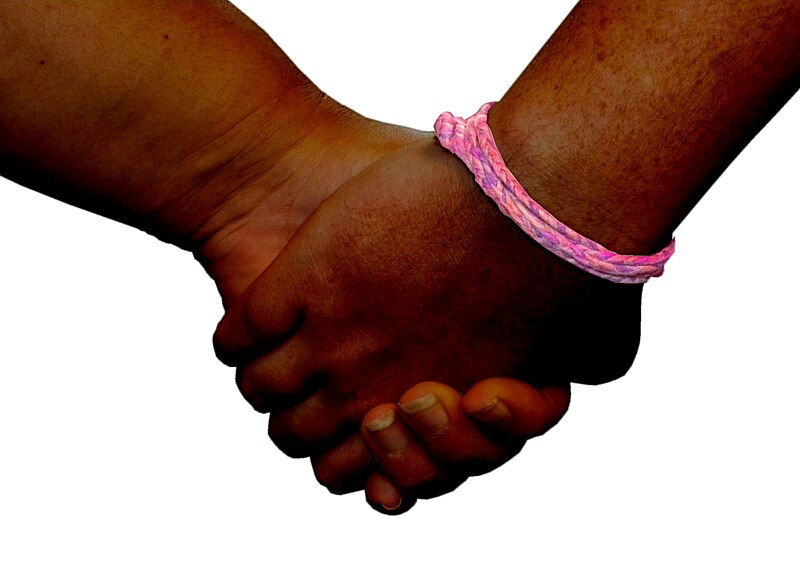
By: Noor Mohamed Initiating conversations about female genital cutting (FGC) can potentially pose significant challenges, particularly when engaging with men. Yet, these discussions can play a vital role in fostering an understanding of and helping to drive positive change toward abandonment of FGC within communities. Exploring this sensitive topic with men opens avenues for uncovering deeply held beliefs, cultural nuances, and personal experiences that can shed light on the complexities surrounding FGC. It is through these conversations that we gain deeper insights into the underlying factors influencing attitudes toward FGC and pave the way for meaningful dialogue and collaboration toward addressing this issue. Navigating Sensitive Conversations: Unveiling Perspectives on Female Genital Cutting For my master’s thesis on the cultural acceptance or condemnation of female genital cutting in the USA, engaging with fathers turned out to be pivotal in my research success and was central to my learning. Here’s how I approached it. A Respectful Approach As a Sudanese researcher (EM), it was important for me to conduct interviews with respect and politeness, because respecting men is a big part of my culture. In our community, a woman’s reputation can be easily damaged if sensitive topics are discussed too openly. So, I made sure to meet each person respectfully, making them feel valued and comfortable. I initiated discussions by focusing on women’s roles in society and the family to create a formal yet inviting atmosphere for fathers to share their thoughts openly. Navigating Sensitive Topics: Sensitive topics, including intimate matters, were avoided, such as: how does a wife with cut genitals experience sex? Is sexual intercourse a source of joy for both partners or does it involve pain? Did they seek the help of a midwife to dilate the vaginal orifice in their early sexual life, if sexual intercourse was not possible due to the small vaginal orifice size? Additionally, questions regarding men’s enjoyment during sex were avoided, and women’s health issues, such as irregular menstrual cycles, were not discussed. Avoiding these types of questions allowed fathers to feel more comfortable and less stressed during the interviews. In many cultures, discussing intimate life can be a sensitive issue that might hinder the continuation of the interview. Therefore, I ensured these topics were avoided to maintain a conducive environment for dialogue. Unveiling Perspectives on FGC Once the initial trust was established and we were discussing women as the center of the project, the conversations moved to opinions on FGC, religious perspectives, and whether they would consider FGC for their daughters. I emphasized that my aim was not to make them oppose FGC but to understand their perspectives. Insights and Reflections These conversations revealed the underlying factors influencing men’s support for FGC and helped identify potential advocates for future anti-FGC educational initiatives. Men who supported the practice often justified it by citing religious reasons, while those against it stressed the importance of education against the practice and expressed their willingness to be part of educational communities. Some fathers felt so comfortable in the discussion that they shared personal stories about their childhood female friends who underwent the practice, describing how these friends were bedridden and unable to play with them. Catalyst for Change Treating participants with genuine courtesy facilitated candid discussions about the complexities of FGC and the challenges of addressing it within communities. In Sudanese culture, men have a significant influence, as their words are highly respected. They have the authority to prevent the practice of female genital cutting (FGC) from being imposed on their daughters or younger sisters, overriding the influence of grandmothers and wives who might support the tradition. Additionally, men can freely discuss with other men why FGC is a harmful practice without fear of being judged. This cultural dynamic underscores the importance of engaging men in discussions and decisions regarding FGC Concluding thoughts Discussing FGC with fathers has its challenges, but the rewards for understanding and potentially intervening to change social norms come from talking to all concerned with respect, dignity, and an eye to learning diverse perspectives on a very important issue. Even when interviewing women, respect was paramount. This respect is a way to show that I, as an interviewer, am still following our cultural norms when it comes to talking about sensitive topics like FGC, which matters greatly to participants. It is important not to stress that FGC is a wrong practice. The interview or discussion should show that you are someone seeking others’ opinions about the practice. This approach helps avoid arguments and enables the collection of adequate information that can help in building future research or educational plans. In honor of Father’s Day 2024, Sahiyo’s male engagement program, Bhaiyo, has launched a month-long public awareness campaign to uplift the importance of male voices and allies in ending FGC. If you would like to contribute, please email sheena@sahiyo.org. Related: Breaking the Silence: A Conversation with My Father About FGM/C How to have effective conversations about FGC Why men too must speak out against Khatna The practice of khatna on girls must stop
